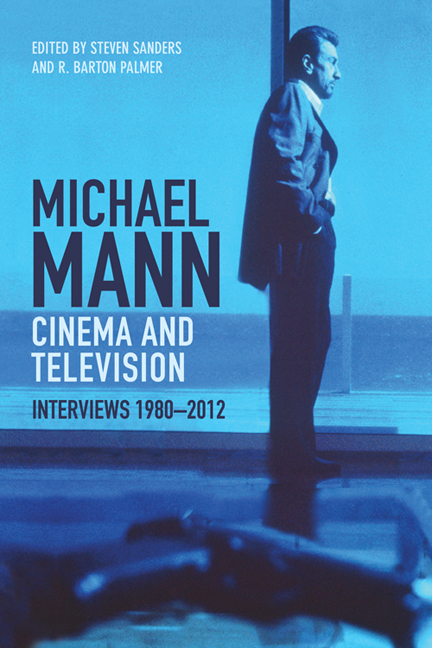Book contents
- Frontmatter
- Contents
- List of Illustrations
- Acknowledgements
- Introduction: Michael Mann in His Interviews
- 1 Four Minute Mile
- 2 Castle Keep
- 3 Of Vice and Mann
- 4 Manhunter: An Interview with Michael Mann
- 5 Michael Mann: Hollywood Writer–Director–Producer
- 6 Mann and His Movies
- 7 All the Corporations’ Men
- 8 Smoking Gun
- 9 “Ali Likes the Film a Lot. He's Seen it Six Times”
- 10 Paint it Black
- 11 Mann Among Men
- 12 L.A. Belongs to the Coyotes
- 13 Michael Mann Interview
- 14 A Mann's Man's World
- 15 Number One with a Bullet
- 16 The Study of Mann
- Chronology
- Filmography
- Publisher's Acknowledgments
- Index
14 - A Mann's Man's World
Published online by Cambridge University Press: 05 September 2016
- Frontmatter
- Contents
- List of Illustrations
- Acknowledgements
- Introduction: Michael Mann in His Interviews
- 1 Four Minute Mile
- 2 Castle Keep
- 3 Of Vice and Mann
- 4 Manhunter: An Interview with Michael Mann
- 5 Michael Mann: Hollywood Writer–Director–Producer
- 6 Mann and His Movies
- 7 All the Corporations’ Men
- 8 Smoking Gun
- 9 “Ali Likes the Film a Lot. He's Seen it Six Times”
- 10 Paint it Black
- 11 Mann Among Men
- 12 L.A. Belongs to the Coyotes
- 13 Michael Mann Interview
- 14 A Mann's Man's World
- 15 Number One with a Bullet
- 16 The Study of Mann
- Chronology
- Filmography
- Publisher's Acknowledgments
- Index
Summary
If it is true, as Jean Renoir said, that a director makes only one movie, then Michael Mann makes the one I don't just want to watch, it's the one I want to live in. Perhaps you have seen it. It is the story of the night and the city and the men who inhabit it – professionals to the core who operate on instinct, sometimes living inside the law, but more often indifferent to it. They will meet on rooftops or in desolate industrial expanses to suss out the terrain, plotting their next move, while the low rumble of an electric guitar sounds in the distance. Inevitably, there will come a woman, and with her the momentary illusion of a “normal” life. And just as inevitably, that hoped-for bliss will prove as out of reach as Proust's dream of fair Albertine. This is not always the story, for Michael Mann has made a historical epic about the French and Indian War (The Last of the Mohicans), a supernatural fable set in the waning days of World War II (The Keep), and a fine, underrated biopic of Muhammad Ali. Yet even those films are finally portraits of solitary men on a mission, the last exponents of some dying way of life. This is as true of Hawkeye the Mohican as it is of the journalist Lowell Bergman, the subject of The Insider (1999), who is willing to sacrifice himself to protect his source. Surely, if Mann had lived at the time of his namesake, director Anthony Mann (no relation), he would have been a master of noirs and Westerns. Now he is the maker of such films reconceived as existential urban tragedies.
What I am describing here is not some adolescent when-men-were-men fantasy (on my part or Mann's), but rather the sense of profound symbiosis between the content of a film, its form, and the personality of its maker. It's the feeling that a movie isn't just telling a story, but expressing a fully realized sensibility about the world and the motives of human behavior. This is the experience you get watching the movies of the directors Mann names as his influences – Dreyer, Murnau, Eisenstein – and of several others he does not mention but whose presence is nonetheless felt: Bresson, Peckinpah and Jean- Pierre Melville.
- Type
- Chapter
- Information
- Michael Mann - Cinema and TelevisionInterviews, 1980-2012, pp. 101 - 108Publisher: Edinburgh University PressPrint publication year: 2014



